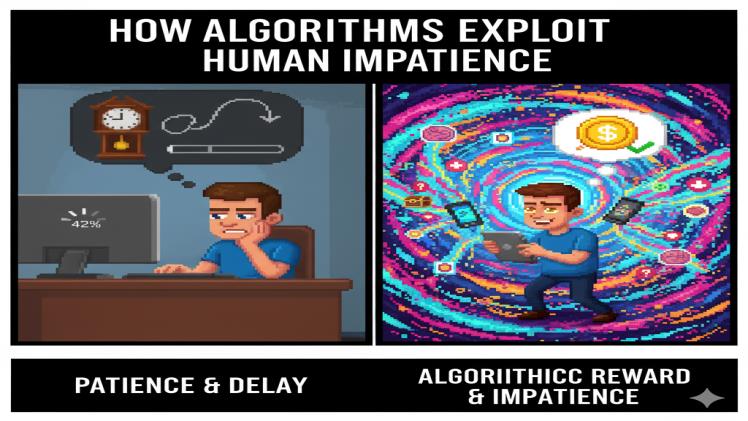How Algorithms Exploit Human Impatience
Patience can be a superpower in our busy, digitized world. However, our brains are programmed to be ready to offer immediate rewards, and smart algorithms have learned to play on this behaviour. Whether it is through interminable social media feeds or gamified games like Dragon Slots Portugal, the mechanisms that make us impatient are everywhere — and they are worth knowing.
The Nature of Impatience
Impatience is not only a vice of character, but it is a trait of the human mind. At its most fundamental level, impatience is the brain’s preference for immediate rewards over delayed rewards. Psychologists refer to this temporal discounting as the tendency to place greater value on a small treat now than on a larger one in the future. This is why it is torturous to wait in line for your coffee, or why you are unable to resist checking your notifications every few minutes.
Decision fatigue also interacts with impatience. The more options available, the less strength we need to wait for gratification. Every click, swipe, and spin is a micro-decision, and algorithms are designed to exploit this mental fatigue.
The Neuroscience of Instant Rewards.
Our need to have something now is within our biology. The dopamine system, specifically the nucleus accumbent, lights up when we expect a reward. The tug-of-war with this surge of Dopamine is often lost by the prefrontal cortex, which regulates self-control.
These interactions produce a dopamine loop: a short-term spike of pleasure promotes the repetition of behaviour. Small, random incentives, such as a spin of the Dragon Slots Portugal spinner or a pleasant surprise, are just enough to sustain the loop in the digital world and enable the habit to become solid without us necessarily paying attention.
Algorithms with the Engagement in mind.
The new platforms do not only wait for us to do something; they actually design our impatience. It uses algorithms to study our behaviour, which prompts us to select either the quickest responses or the longest sessions. Push notifications, auto-refreshing feeds, and progress bars are specifically designed to capitalize on our need for instant gratification.
This is not new, even when there is no gambling. Consider electronic stores with temporary offers, or social programs with infrequent incentives to keep people interested. These online spaces capitalize on the concept of variable-reinforcement schedules, borrowed from behavioural psychology, to help us come back. It is all about being unpredictable; attracted to what may be found on the next click.
Gamified Experiences Lessons.
Although this paper does not focus on gambling itself, websites such as Dragon Slots Portugal and live casino interfaces are excellent examples of how these dynamics should be. Our impatience circuits are stimulated in these conditions, when near-misses are anticipated or when we have even a small win. This is enhanced by live dealer casino experiences, where decisions and results are made and known instantly, and there is some form of pressure due to the social aspect of the experience.
Cognitive biases influence algorithms, whether we are watching or playing, which is a general fact of digital Engagement: our algorithms are designed to exploit our susceptibility to cognitive biases, such as a sense of control or a tendency to seek unpredictable rewards. It is easier to identify these patterns in a familiar setting, and one can use that knowledge to discern their impact in new environments, whether in gaming, shopping, or scrolling through social media.
Expert Perspective
Behavioural economists emphasize that these systems leverage the most ingrained human tendencies. No weaknesses in instant gratification and impulsive decision making; these are purely evolutionary aspects that served survival purposes in the past. Algorithms nowadays transform them into Engagement metrics. The first one is awareness: by understanding how our focus is controlled, we can take it back.
In addition, analysts note that digital platforms are often dependent on subtle encouragement rather than coercion. Micro-rewards, variable schedules, and social reinforcement all combine to form a feedback loop which becomes voluntary, despite influencing our behaviour. Understanding such interactions will help explain why we can and do click, scroll, and spin more than we want, and why Dragon Slots Portugal and deceptively attractive sites like it are so engaging yet not addictive.







